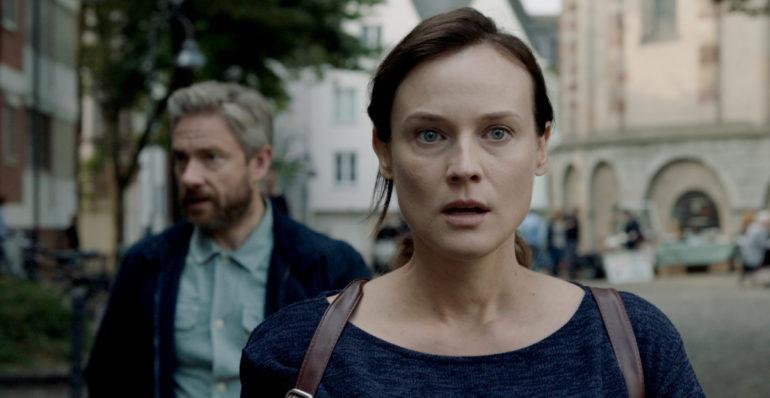Berlin Film Review: ‘The Operative’
By Guy Lodge
LOS ANGELES (Variety.com) – “Operation ‘Business As Usual’” is the name of the undercover mission assigned to Mossad agent Rachel Currin in Tehran: a knowingly ironic label for a challenging undertaking that gets considerably less orthodox the longer it goes on. Less knowingly, it would also be an appropriate title for “The Operative,” a proficient but unsurprising espionage thriller from Israeli writer-director Yuval Adler that offers another well-fitted showcase for Diane Kruger’s stern resolve as a performer. Rather like Fatih Akin’s recent “In the Fade,” it’s an otherwise fairly impersonal genre piece that hangs on its leading lady’s every word, move and steel-eyed glance. Kruger’s presence will secure international interest in this out-of-competition Berlinale premiere, with multi-platform distribution a likely part of its business plan.
A few episodes of the USA Network series “Shooter” aside, this is Adler’s first work as a director since his 2013 debut “Bethlehem,” a taut, effective suspenser built around the Arab-Israeli conflict that promised bigger things to come. As a sturdy, intelligent mainstream entertainment, “” delivers on that promise, though “Bethlehem’s” agitated, streetwise flavor has been somewhat diluted.
Adler’s freshman feature was unlucky to arrive mere months after Hany Abu-Assad’s Oscar-nominated “Omar,” to which it coincidentally bore striking narrative similarities. If his second feels familiar, that’s less accidental, given the long line of Le Carré and Le Carré-style spy yarns preceding both the film and its well-received source novel, former Israeli intelligence officer Yiftach Reicher Atir’s “The English Teacher.” A tradition of storytelling, in other words, is being dutifully maintained here. That said, time is still not entirely on Adler’s side: As a study of a strong lone woman tangled up in Mossad skulduggery, “The Operative” does seem a dowdier companion piece to Park Chan-wook’s recent, electrifying TV adaptation of “The Little Drummer Girl.”
Adler’s screenplay jumps briskly back and forth in time, opening the narrative at a crux point about two-thirds of the way in, before rewinding and stealthily circling back to it — a currently ubiquitous thriller framework that the film maintains tidily enough, though it does sap the early stages of some tension. Thomas (Martin Freeman), a British spy handler stationed in Berlin, receives a cryptic phone call out of the blue from Rachel (Kruger), the formerly Tehran-based agent with whom he had been closely working before an unexplained fallout; Mossad urgently instruct him to reel her back in.
Flashback to, well, moderately happier times, as the Tel Aviv-based, British- and Canadian-raised Rachel — the kind of rootless international mongrel practically reared for espionage — is recruited by the Israeli agency, posing as an English teacher and initially acing her modest surveillance tasks while forming a trusting bond with Thomas. When she’s deemed ready for a higher-stakes assignment in Iran, things get complicated fast. Called upon to infiltrate a Tehran electronics company, using them to transfer defective nuclear components to Iranian intelligence, she goes decidedly off-plan by starting an intimate affair with Farhad (Cas Anvar), playboy hotshot of the company. Kruger’s tightly controlled, head-down performance works in such a way that we’re never quite sure if she’s in love or playing some counter-game of her own. Either way, as the situation escalates, Rachel, Farhad and Thomas are all variously pinned down and stitched up by secrets and conflicting loyalties.
Adler and editor Hansjörg Weißbrich put the story through the criss-crossed motions at a fair, even pace. The result is consistently diverting, but aside from one genuinely alarming, claustrophobic sequence of peril — cramming Rachel in the undercarriage of a truck with four Iranian men of uncertain allegiance and motive — the general shape of the plotting is too recognizable to keep us entirely on edge, despite the stoic, furrowed-brow dedication of the cast. A sliver of dry humor wouldn’t go amiss, but even the reliably wry Freeman is on entirely fretful form. He and Kruger do have quiet, empathetic chemistry that keeps the film’s dizzier later developments on track. Rachel and Farhad’s relationship, meanwhile, never quite catches fire on screen, though Anvar does well in a tricky role pitched halfway between villain and stooge.
Technical credits follow the general party line of unshowy efficiency, though Kolja Brandt’s gray-and-tan lensing occasionally equates underlighting with seriousness of intent; the distinctive local character of Tehran, in particular, is sold a little short in a story that largely unfolds in identikit office interiors. (This is Operation ‘Business As Usual,’ after all.) To be fair, perhaps there’s something in the film’s visual language of intelligence work’s suffocating resistance to distinguishing features: Adler’s still-auspicious sophomore film finally creates a world its hard-to-read heroine can glide through as sleekly and untraceably as possible.

